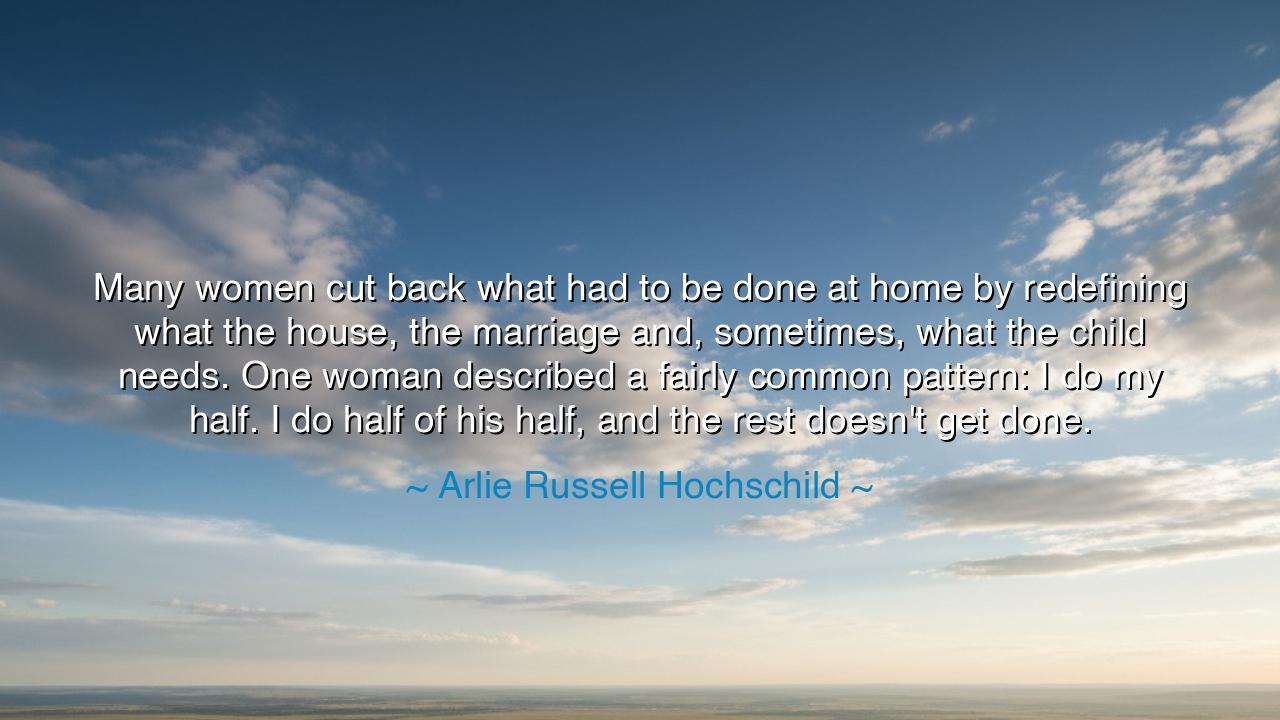
Many women cut back what had to be done at home by redefining
Many women cut back what had to be done at home by redefining what the house, the marriage and, sometimes, what the child needs. One woman described a fairly common pattern: I do my half. I do half of his half, and the rest doesn't get done.






There are words that pierce through the quiet surface of ordinary life and expose the hidden weight beneath. Such are the words of Arlie Russell Hochschild, who, in her wisdom and research, revealed one of the great unseen labors of modern times. She wrote: “Many women cut back what had to be done at home by redefining what the house, the marriage and, sometimes, what the child needs. One woman described a fairly common pattern: I do my half. I do half of his half, and the rest doesn’t get done.” These words are not merely sociological observation; they are a lament and a mirror, showing how the burden of invisible labor still bends the backs and spirits of countless women who carry the silent work of the home.
In this saying, Hochschild unveils the quiet truth of what she famously called the second shift — the labor that begins when the day’s paid work ends, when the office closes but the household opens. Her words arise from decades of study, drawn from interviews with working women in the late twentieth century, who found that equality in name did not always mean equality in life. Even as women entered the workforce beside men, their hands still cooked the meals, folded the clothes, soothed the children, and remembered every small necessity that kept life from unraveling. “I do my half. I do half of his half,” one woman said — a statement both weary and heroic, carrying the rhythm of endurance that echoes through generations.
To “cut back what has to be done” is not laziness, but survival. It is an act of redefinition, a strategy born of exhaustion and strength. Faced with too much to do and too little time to do it, women learned to loosen the standards society had bound them to — to let the dust gather, to simplify meals, to accept that love could live in an imperfect home. In this act, there is quiet defiance. For centuries, the measure of a woman’s worth was tied to the cleanliness of her house or the fullness of her table. Hochschild’s words reveal the moment when that measure begins to crack — when women reclaim their right to rest, even if the world calls it neglect.
The ancients, too, spoke of balance between the inner and outer life. In Greece, Penelope kept the home of Odysseus not only with thread and needle, but with patience and wisdom. Yet, even she was celebrated for her endurance, not her peace. How many modern Penelopes weave and unweave their to-do lists every night, holding family, career, and identity together with fraying thread? Hochschild’s quote reminds us that this endurance, though noble, comes at a cost — for the burden of doing “half of his half” slowly erodes the spirit of partnership and replaces it with quiet resentment.
In this truth lies both tragedy and awakening. For when Hochschild captures the words of that unnamed woman, she is recording not just fatigue, but the birth of awareness — the realization that inequality, though unspoken, persists even in love. Her research, compiled in The Second Shift (1989), gave language to what millions had felt but could not name. By naming it, she turned the private struggle into public consciousness, giving rise to discussions of domestic labor, emotional labor, and shared responsibility that still shape the modern understanding of family.
And yet, her words also teach compassion, not accusation. They ask us to see the quiet heroism in those who carry more than their share and to seek justice not through blame, but through shared understanding. A true home is not built on the shoulders of one, but by the joined hands of two. In every relationship — between partners, between generations — there must be honesty about the work that sustains life, both visible and invisible. When love is genuine, it does not seek to divide the labor unevenly, but to lighten it together.
Thus, the lesson of Hochschild’s wisdom is timeless: balance cannot be given — it must be built. Let no one assume that equality is achieved simply because it is declared. Let every family, every couple, every partnership examine its rhythms, its silences, its unspoken expectations. The true measure of progress is not in words, but in the quiet hours when dishes are washed, when children are comforted, when exhaustion is shared instead of endured alone.
So remember this, O listener: if ever you find yourself saying, “I do my half, I do half of his half,” know that your words are not weakness, but testimony. You are part of a long lineage of builders — of women who redefined the meaning of work, home, and worth. But let your endurance not end in silence. Speak your truth, as Hochschild taught the world to do. For when labor is shared in love and fairness, then, and only then, does the home truly become a place of rest, not burden — a sanctuary, not a battlefield.






AAdministratorAdministrator
Welcome, honored guests. Please leave a comment, we will respond soon